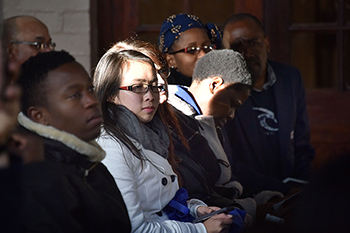Latest News Archive
Please select Category, Year, and then Month to display items
12 October 2020
|
Story Arina Engelbrecht
|
Photo Supplied
 Arina Engelbrecht from Organisational Development and Employee Well-being believes physical activity has a number of benefits for one’s health, including stress relief.
Arina Engelbrecht from Organisational Development and Employee Well-being believes physical activity has a number of benefits for one’s health, including stress relief.
Being physically active plays a big role in preventing the development of mental-health problems and in improving the quality of life of people experiencing mental-health problems.
Treatment for depression
Physical activity can be an alternative treatment for depression. It can be used as a stand-alone treatment or in combination with medication and/or psychological therapy. It promotes all kinds of changes in the brain, including neural growth, reduced inflammation, and new activity patterns are formed that promote feelings of calm and well-being. It releases endorphins – powerful chemicals in the brain that energise your spirit and make you feel good.
Physical activity can be very effective in relieving stress. Research in adults has found that physically active individuals tend to have lower stress levels compared to individuals who are less active. It also leads to improved sleep. When a person sleeps better and feels more rested, overall quality of life improves. They cope better with daily life stressors.
Reduce Alzheimer's risk
Regular physical activity can reduce your risk of developing Alzheimer's disease by up to 50%. It can also slow down further deterioration in those who have already started to develop cognitive problems. It stimulates the brain’s ability to maintain old connections as well as to make new ones.
A study asked people to rate their mood immediately after periods of physical activity (e.g. going for a walk/run, cycling, doing housework) and periods of inactivity (e.g. reading a book or watching television). Researchers found that participants felt more content, more awake, and calmer after being physically active compared to after periods of inactivity.
In conclusion, people who are physically active feel a sense of well-being, feel more energetic throughout the day, sleep better at night, have sharper memories, and feel more relaxed and positive about themselves and their lives.
“Being physically active not only changes your body, it changes your mind,
attitude, and your mood.” – Arina Engelbrecht
Postgraduate Open Day: Mapping the journey
2016-06-27

Prospective postgraduate students listen
attentively at the Postgraduate Open Day
Photo: Charl Devenish
“Whether you are a psychologist, a theologian, an economist, a political scientist, a chemist, or a physician, the purpose of knowledge is to improve the lives of others.”
Prof Jonathan Jansen, Vice-Chancellor and Rector of the University of the Free State (UFS), was speaking at the opening of the Postgraduate Open Day, held on our Bloemfontein Campus on 22 June 2016. In addition, he highlighted these grounds for considering postgraduate studies:
• To be globally literate and globally mobile
• To gain the satisfaction of understanding the world more deeply
• To serve as an inspiration to others to further their studies
Prof Fanie Snyman, Dean of the Faculty of Theology, said, “One of the benefits of postgraduate studies especially is that they enable you to think critically. This capacity helps you to understand society better—even outside your field of expertise.”
Prospective postgraduate students were assisted in selecting a suitable postgraduate degree, as a first step in mapping out their postgraduate journey at the UFS.
Kgosi Makhetha, who is currently studying a degree in Business Administration, agreed with Prof Jansen, saying, “Studying gives me great satisfaction. I truly believe that postgraduate studies will give me an edge in the current labour market.” Kgosi plans to enrol for an Honours degree in Industrial Psychology in the Faculty of Economic and Management Sciences.
Prof Jansen concluded by exhorting students to “study to make a difference.”